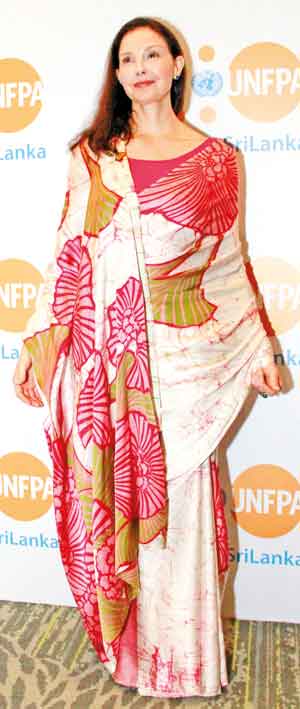‘I’m here as a global citizen, not as an American’- Ashley Judd

A saree- clad star: Ashley Judd in Colombo. Pic by Indika Handuwala
Dressed in a striking batik saree, Hollywood actress, author, and The United Nations Population Fund (UNFPA) Goodwill Ambassador Ashley Judd addressed the media at Jetwing Colombo on February 7, speaking passionately about her mission’s goals. Joining her at the head table was UNFPA Representative in Sri Lanka Ritsu Nacken.
During her short stay in the country, Ashley Judd visited MAS Holdings where she observed women’s economic independence, spoke to students from the University of Peradeniya on gender based violence, visited the De Soysa Hospital for Women and even contemplated a visit to the north.
Appointed Goodwill Ambassador in 2016, she has travelled to Jordan, Turkey, Ukraine and India. “I believe that her visit to Sri Lanka added another aspect to her perspective,” Ms. Nacken said, adding that although Sri Lanka is well on its way to becoming a middle income earning country, there are still crevices to the sustainable development goals that the country must adhere to.
Ashley’s work has also taken her to countries like Jordan – which is struggling with an enormous influx of Syrian refugees. She says that in Jordan one of UNFPA’s goals in relation to sexual and reproductive health was to “make sure every pregnancy is intended and wanted, every childbirth safe and that every youth has the ability to live up to their potential.”
In contrast she adds “What’s so interesting and different about Sri Lanka is that you represent what can happen when a country is able to empower its people through universal access to education, health care to reduce maternal mortality and to have capacity building and partnership with the government in such a way to strengthen your local institutions.”
She looked every journalist in the eye as she said: “I want to mention that although I am American I don’t swoop in here as if my country is good, right and perfect. I come to you as a global citizen and not a high and mighty American! I can hopefully help do some good.”
The New York Times report of her own personal experiences with entertainment moghul Harvey Weinstein hit the headlines last October and resonated with women around the world. “Breaking the silence is the first step to the enormous change and societal shift that can and must happen,” she said.
“Do the right thing,” she said, adding “I can’t guarantee the response will be the watershed reckoning that’s happened in the United States around sexual harassment but I know that it’s the right thing to speak up.”
Asked how movements like #Metoo helped as a non- policy based solution to tackling gender based violence, she recalled with a smile the innovative solutions through her craft of theatre that allowed students from the University of Peradeniya to share their stories.
Asked to represent what violence looks and feels like in 5 sectors; on social media, at home, at university, in the work place and public transport, for social media the local students used the #metoo campaign and the participation of both girls and children on the internet. Due to the inclusiveness of the net this gave prominence to the need for “the internet to be a free and safe place where everyone can participate free from bullying and misogyny,” Ashley said.
For family violence, students drew a man with his mouth open and a fist emerging from within – a depiction of “violence of words”. “His hand had a wedding ring on and the other clutched flowers and a card for his wife, highlighting a love-hate ‘I’m sorry – I wouldn’t do it again’ kind of relationship”, she said. The students also presented a 40 minute play on abuse and harassment in public transport creating 12 minute scenes giving different scenarios on how they would have reacted if empowered Ashley shared.
On groups like the vulnerable LGBTQI societies Ashley affirmed that her goals “are to protect and empower the sexual and reproductive health of all folks everywhere”.
She also spoke of UNFPA’s vision of “advocating voluntary human rights based on individual empowerment regarding one’s reproductive health, the opportunity and dignity of deciding if and when and how many children to have and that requires making all kinds of levels of modern family planning available in the country.”
Having been molested at the age of 7, a victim of three rapes and sexual harassment she affirmed, “We need safe spaces where we can talk to one another, where we can have the courage and resilience to speak our truth with dignity and respect. It’s so important that we women talk to each other because that’s where we get so much of our information from.”
“Everyone is different” and no experience is “a contest on who is more hard done by.” She painted her own utopia to the press as she said, “We’re looking for a world where gentleness, tenderness and kindness are as valued as the norms of toxic masculinity that are so celebrated.”


